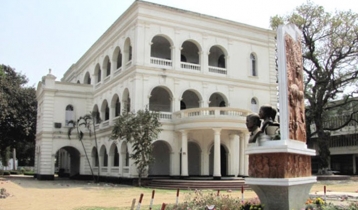Kazi Nazrul Islam`s 122nd birthday Tuesday

The 122nd birth anniversary of National Poet Kazi Nazrul Islam is being celebrated across the country on Tuesday through various programmes.
A poet, journalist, lyricist, composer, playwright and novelist, Kazi Nazrul is one of the most celebrated cultural icons of the nation.
His fiery poems had made him a rebel poet and encouraged the subjugated mass people to fight against repression and injustice of the British colonial rule.
The nation got inspirations from his poems and songs during the Liberation War and all democratic movements and struggles.
On the occasion of the birth anniversary of the national poet, President Md Abdul Hamid and Prime Minister Sheikh Hasina issued separate messages, paying rich tributes to the polymath.
Like the previous year, there will be no public function because of the coronavirus pandemic and ongoing countrywide restrictions imposed by the government.
Dhaka University Vice-chancellor Prof Dr Md Akhtaruzzaman, delegation of different political parties, family members of the poet, activists of different social and cultural organisations and people from all walks of life placed wreaths on the grave of the poet this morning.
Dhaka University, Bangla Academy, Nazrul Institute, Bangladesh Shilpakala Academy, Chayanaut and many other socio-cultural organisations arrange special programmes to mark Nazrul’s birth anniversary.
Most of these programmes will be held virtually to maintain social distancing and following other health guidelines.
Bangladesh Television and other private television channels and Bangladesh Betar and FM radio stations are airing special programmes to mark the occasion. Newspapers published special contents, highlighting the life and works of the national poet.
Born on May 25, 1899 at Churulia village in Burdwan district of West Bengal in undivided India, Nazrul had to discontinue his study at an early age for earning his living as his father died when he was only 11.
Initially, Kazi Nazrul had joined a professional Leto troupe where he was introduced to the richness of Bangla and Sanskrit literature.
A year later, he resumed education and got enrolled in Matharun English School but dropped out from Class VI for poverty. This time, he worked with a Kabi Gaan troupe and subsequently took up a job at a bakery.
While working there, Nazrul started writing poems and his talent soon grabbed the attention of a police officer named Kazi Rafizullah, who gave him shelter at his house in Mymensingh’s Trishal in 1914, and enrolled him in Class VII at Darirampur School.
He joined the British Army in 1917. During his two and a half years of service, the young poet was introduced to Persian literature and learned to play different instruments following notation.
Nazrul’s literary practice got a formal shape at that time. His first poem Mukti, first novella Bounduler Atmakahini, novel Badhon Hara and a number of other writings were published in that period.
From 1920, he concentrated on creating his literary masterpieces. Many of his famous poems appeared during the period.
Nazrul came to Cumilla in April 1921 and met Promila Devi, a young Hindu girl whom he loved and married subsequently.
In 1922, he began editing a fortnightly named Dhumketu which literally stormed the British rulers in India.
On October 13, 1922, Kazi Nazrul Islam, as the first person in the sub-continent, placed the demand for independence in an article published in Dhumketu.
For his political poem Anondomoyir Agomone, he was sentenced to a one year in jail.
While staying in prison, the poet began hunger strike, protesting the mistreatment by the British jail superintendent. He was released consequently but the British government banned most of his books throughout the 1920s.
In his short creative life, Nazrul also worked as a lyricist and music composer for popular music brand HMV (His Master’s Voice). He developed 17 new ragas and created six new taals or rhythms.
He acted in a film and directed music as well. He joined the All India Radio Kolkata in October, 1939.
Kazi Nazrul suddenly became sick in 1942 and was diagnosed with a rare neurological disorder ‘Pick’s disease’ that led to the loss of his voice and memory. He was sent abroad for treatment but he did not recover from the disease.
In his short artistic career of just 20 years, he penned 3,174 songs, 600 poems, three novels and 43 essays.
After the country’s independence in 1972, Nazrul was declared as the national poet and Bangabandhu brought the ailing poet with due honour to Bangladesh. Nazrul died in Dhaka on August 29 in 1976.
























